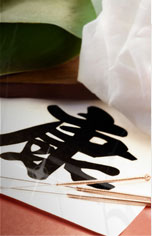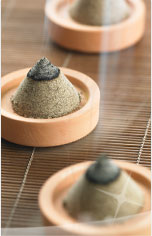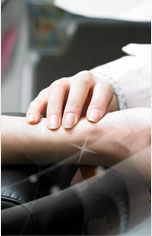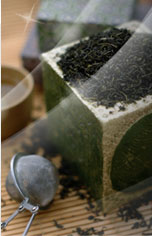
Menopause indicates the permanent end of menstruation; a woman has reached menopause when she has not had a period for one year. Menopause usually happens between 45-55 years of age as the woman's ovaries stop producing the hormones estrogen and progesterone.
Menopause is not a disease, it is a natural biological process which happens in all women's life. For some women, it may be a very easy transition with mild or no symptoms, but others may suffer from various physical and emotional symptom months or years before and after menopause.
Common signs and symptoms of menopause are:
- Irregular periods
- Vaginal dryness
- Hot flashes and/or night sweats
- Sleep problems
- Mood swings
- Weight gain and slowed metabolism
- Hair loss and dry skin
Treatments for menopause focus on relieving the signs and symptoms and preventing or managing chronic conditions that may occur with aging. Conventional treatments include hormone replacement therapy, antidepressants, vaginal lubricants, and medications to treat hot flashes and osteoporosis.
Menopause in TCM
|
|
The Kidneys in Traditional Chinese Medicine (TCM) have overlapping and additional functions of the kidneys in Western medicine. Besides being the body’s filter through the urinary process, the Kidneys in TCM are also responsible for growth, maturation, and reproduction.
In TCM, menopausal symptoms are generally because of a decline of Kidney Essence (Jing). Kidney Essence is the material base of Yin and Yang, and the energy source for all the other Zang Fu organ systems of the body for their function. Kidney essence originates from the two sources, inheritance and diet after the birth. When Kidney Essence is abundant, the body's ability to adapt to disease, illness and stress is optimal. Kidney Essence slowly declines as we age. When Kidney Essence depletes, other organ systems also become imbalanced, eventually leading to various symptoms and signs, such as graying hair, loss of libido, weakness of knees, poor memory, and fatigue.
|
|
Kidney Essence Is Affected by
- Inherited weakness
- Poor diet
- Emotional stress
- Overwork
- Giving birth to too many children too close together
|
|
Decline of Kidney Essence can take the form of Kidney Yin deficiency, Kidney Yang deficiency, or a combination of Kidney Yin and Kidney Yang deficiency. When Kidney Yin is more deficient, indicating there is not enough fluid to nourish the body and too much heat, heat symptoms will naturally arise. Examples of heat symptoms includes: excessive thirst, hot flashes, night sweats, constipation, restlessness, mood swings, heart palpitations and insomnia. When Kidney Yang is more deficient, indicating declined warming and metabolizing power of the body, it will create symptoms such as cold hands and feet, weight gain, edema and frequent urination.
NOTE: The names of organs are capitalized when referring to the entire, functional organ systems in TCM perspective: Liver, Blood, etc. The names of organs are lower-cased when referring to the distinct, biomedical organs: liver, blood, etc.
TCM Treatment for Menopausal Symptoms
TCM has a long and successful record in treating gynecological disorders, including menopause. Although Acupuncture and Chinese herbal medicine can not prevent or delay the onset of menopause, they offer a safe, natural, and effective way of reducing the severity of menopausal symptoms. TCM sees menopause as a transition of women’s body that starts to preserve Qi (the vital energy of the body) and Blood for sustaining vitality and extending longevity. Together with proper diet and lifestyle, acupuncture and Chinese herbal medicine can help you move into the next phase of womanhood feeling healthy and empowered.
An individualized TCM treatment plan will be established for each patient based on the type and severity of menopausal symptoms, distinct patterns of internal imbalance and complete medical history. As a patient’s symptoms and imbalances improve, the treatment will be adjusted accordingly. Healing time depends on the severity of symptoms and general health of the patient. Some patients report relief within 5 sessions of acupuncture, while others may take up to several months to notice improvement. A typical treatment for menopausal symptoms consists of daily intake of Chinese herbal medicine combined with 1-2 acupuncture sessions a week, tapering as the patient’s symptoms improve.
Acupuncture
Acupuncture is a safe and effective form of treatment for menopausal symptoms. The procedure consists of stimulating specific points on the body by inserting fine, sterile needles. Acupuncture benefits both physical and mental / emotional functioning by promoting the smooth flow of Qi and Blood and restoring the balance of internal Zang Fu organs.
Clinical and laboratory findings have revealed that acupuncture can improve menopausal symptoms by:1
- increasing estrogen levels
- decreasing levels of follicle-stimulating hormone (FSH) and luteinizing hormone (LH)
- inhibiting gonadotropin-releasing hormone (GnRH)
- increasing dopamine and gamma aminobutyric acid (GABA)
- decreasing aspartate and glutamate
- regulating blood lipid
- suppressing oxidative stress
- regulating alkaline phosphatase (ALP) and deoxypyridinoline (DPD) in bone metabolism
In a study published in 2016 noted that significant clinical improvement in vasomotor symptoms (usually described as hot flashes and night sweats) was observed after three acupuncture treatments, and maximal clinical effects occurred after a median of eight treatment. The study also stated that persistent improvements were seen in many quality of life-related outcomes for at least 6 months beyond the end of treatment in the acupuncture group relative to the control group.2
Chinese Herbal Medicine
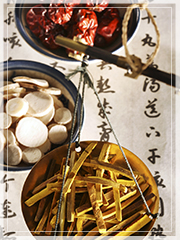
For most gynecological disorders, including menopause, Chinese herbal medicines are recommended to correct imbalance of the internal organs and to increase the effect of acupuncture treatments. Chinese herbs are used to tonify and balance Kidney Essence, Yin and Yang and assist the circulation of Qi and Blood.
Researchers from the Heilongjiang University of Chinese Medicine determined that a combination of acupuncture and herbs successfully relieve insomnia, hot flashes, mood swings, fatigue, and excess perspiration in perimenopausal women (Cong et al.). Although acupuncture and herbs were effective as standalone therapies, the combination therapy produced increased positive patient outcomes. The combination of Chinese medicine treatment modalities provided significant relief to the patients in the controlled investigation.3
Chinese herbs are usually used in a combination of 2 to 30 herbs and are customarily prescribed for each patient. Herbs can be administered to a patient in many forms. Raw herbs can be taken on a brewed tea form. This herb tea form is strong and quick acting; however, it takes time for cooking and preparation and the taste can be quite strong initially. The herbs can also be prescribed in many other forms such as powder, capsule, pill, topical and tincture. Herbs possess many strengthening as well as therapeutic effects because of their content of various nutrients and vitamins, which are essential to the body. While Chinese herbal medicine can be very potent, it may take a few weeks to months before the full effects are noticed.
Lifestyle Tips
- Avoid smoking, caffeine, alcohol, excess salt, and sugar - They may trigger hot flashes, night sweats and mood swings
- Balanced diet - Nutritionists recommend whole grains, cold pressed oils, leafy vegetables, fruits, and nuts to help keep your body healthy and potentially help relieve hot flashes. Also, choose foods that are low in saturated fat and cholesterol, and eat foods rich in calcium and vitamin D to keep the bones strong.
- Exercise regularly - 30 minutes of daily exercise can improve energy and metabolism, strengthen the joints and bones, and decrease stress. Exercise also helps prevent weight gain, which is quite common during menopause.
For more information on lifestyle tips for menopausal symptoms, click here.
|

